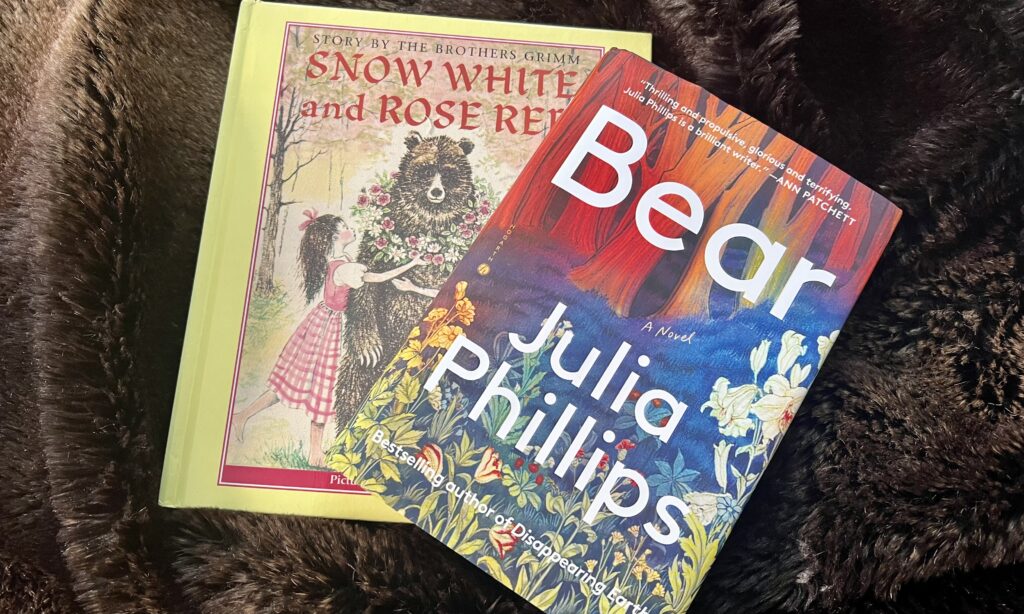My favorite chapter in Julia Phillips’ evocative new novel, Bear, is one line of black text on the surrounding white page: “They woke the next day to a bear at the door.” Part of the enduring power of fairy tales, especially the violent Brothers Grimm originals, is the memory of reading them both as a child and to my own children. Nothing fascinated us more than the Queen in “Snow White” who must dance in red-hot iron shoes until she drops dead or the step-sisters who slice off their heels and toes to cram their bloody feet into Cinderella’s glass slipper. Abandoned children, blinded princes, poisoned apples, cursed or stolen babies. The rewards of being beautiful and pure. The danger from stepmothers, cannibalistic witches, hideous little men, and wild beasts. Is it any wonder we were mesmerized? And is it any wonder that in the more than 200 years since the Grimm stories were first published, writers have been plundering, alluding to, and reimagining these tales? In Bear, Phillips uses “Snow White and Rose Red”—two lovely sisters live with their mother in a cottage in the woods where they shelter a bear: there is a wicked dwarf, sacks of jewels, a magical transformation—as the frame in which to hang her present-day fable. Scattered like breadcrumbs throughout are fairy-tale references, the hint of savagery, and the hope for a happily ever after even as apprehension builds.
Sam and her older sister Elena live with their dying mother in a too-small “1979 vinyl-sided nightmare” of a house on one of the San Juan Islands in Washington state. Elena works long hours at a golf club restaurant while Sam toils at a ferry concession stand serving rich tourists. Unlike Phillip’s excellent 2019 debut, Disappearing Earth, a crime thriller that examined violence against women in interconnected short stories anchored by different voices, Bear unfolds entirely from Sam’s limited, unreliable, and slightly claustrophobic point of view. Sam’s bitterness at being trapped in a dead-end job and her dream of escaping the island for a better life with her adored sister are upended by the unprecedented arrival of a bear whose massive size, intrusive activity, and multi-faceted symbolism affect the sisters in increasingly different ways: “Elena had told Sam that the bear was something extraordinary. She said it was magic—enchanted—a gift from the animal gods…She felt glowing and connected and magnificent. She told Sam that this was the best thing that had ever happened—she said that. Elena. That the bear was what she looked forward to each day. And Sam, even in her fear, crossing into this forest, had come because she believed she might feel that too. She didn’t. She was horrified.”
The ramifications of this disconnect, Elena’s increasingly spellbound behavior, and Sam’s growing resentment and terror propel the novel to its heart-stopping conclusion. Along the way Phillips gives us a few modern princes, a not-so-evil “dwarf” in the guise of an attractive researcher from the Dept of Fish and Wildlife, a beast in the form of their mother’s abusive ex-boyfriend, and of course, the titular bear himself: bewitched suitor and/or vicious threat, whose sudden presence changes everything forever. Fairy tales feed a child’s deepest fears while offering positive endings for the virtuous. In the present-day struggle of poverty, class division, and trauma, the real challenge is to Sam’s childlike belief in happily ever after.

